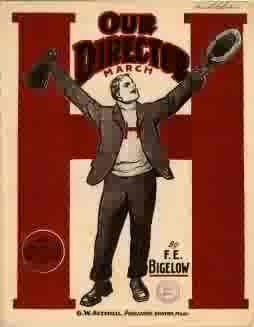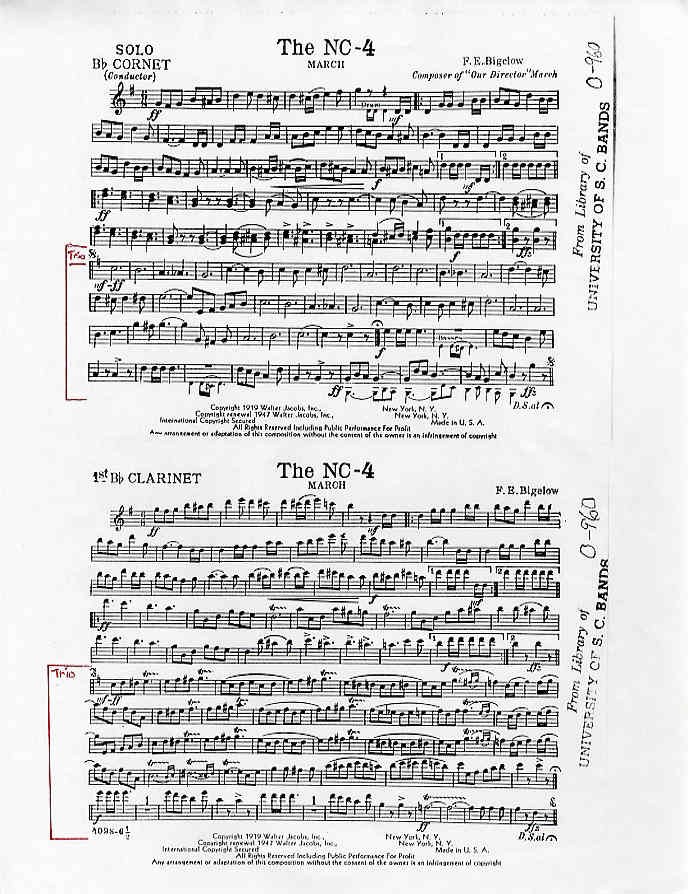
From: http://www.geocities.com/capitolhill/Lobby/7049/ourdir.htm
Sources:
Bigelow Family Genealogy Vol II , p 17 child;
George E. family bible;
obituary of Frederick in Salem, MA, News;
editor wishes to correspond wilh descendants within this family.
Our Director - Bigelow
F. E. Bigelow (1873-1929) spent his life as a pharmacist but played
cornet in numerous New England Brass Bands. Composed in 1892, Our
Director (affectionately known as "O.D.") was adapted as one of
Harvard's School fight songs. The Harvard
Bands continue to perform O.D. at all Harvard events.

According to the Heritage Encyclopedia of Band Music, Our Director
is "one
of the most famous of all marches. It has been adapted by countless
schools,
colleges, clubs and other organizations as their alma mater or fight
song."
Not too shabby, eh?
Our Director was the first of only 3 known works by Frederick Ellsworth
Bigelow (1873-1929.) It was first published in 1895 and arrangements
have
been published throughout this century [oops, the 20th], one at least
as
recently as 1985.
It has an odd tie-in to the guitar world in that Walter Jacobs,
American guitarist and publisher, bought an entire catalog of
orchestral music just to obtain the rights to Our Director. But this
1902 edition is not a result of that; he purchased the catalog in 1917.
In that year Jacobs published a
version with words by Jack Yellen (of Ain't She Sweet fame) called The
Battle
Song Of Liberty.
I know that 19th century music of any sort, and American in particular,
doesn't thrill everybody. A piece like this might invite the question,
why
play something if it isn't great?
First of all, don't knock it until you've played it without flubs at a
good tempo, dotted quarter = 104, say. If you still don't like it,
maybe you should ask what your problem is. After all, the piece has
given a lot of other people a lot of pleasure. Who's to say it isn't
great?
Another reason is that every single piece of music you play is a study
for every other piece you ever will play. Every piece of guitar music
has technical challenges. For example, this piece requires some very
nimble right-hand finger
maneuvers in measure 17 (counting partial measures.)
Another reason is simply for the reading practice. Time spent reading
this will make your first spin through a Bach, Brouwer or you-name-it
piece just a little smoother and easier.
Another reason is for the historical interest. This is what got toes
tapping back then. Wouldn't it be a drag if it were no different from
what's going on now? Playing from an original or facsimile helps to
boost the "time traveling" sensation.
Another reason is the satisfaction that comes with not following
everybody else's beaten, trodden path. Sometimes I've gone overboard,
ranting that you
shouldn't work on anything recorded or performed by somebody else.
That's crazy, of course, but the quantity and variety of music out
there is staggering. And you're not obligated to make a long-term
commitment to this or any piece. In this case, if you leave out
repeats, you can get back to the "great" stuff - whatever that may be -
in a minute and 40 seconds.
The preceding background notes and editorializing are actually
unrelated to what gave me the initial bug to present this piece.
There's a more personal reason. When I stumbled on it in the Library of
Congress, I realized, Holy smokes! This is the one my old piano teacher
used to pound out as his "show piece"! His name was Mr. Peverill. He
was bald and he did magic tricks. My older sisters had started lessons
with him before I did. That was maybe 5th or 6th grade. I was a crummy
pupil. In spite of that, the piano lessons gave me a good grounding in
reading and making music, and the eventual benefit to my life has been
immeasurable. So... I want to thank my parents, Benton and Jane, for
the piano lessons - not to mention a billion and one other things.
End notes:
1. A copy of this piece can be found in the Library of Congress, call
number M127 B. I thank the Library of Congress.
2. Reference: The Heritage Encyclopedia of Band Music by William H.
Rehrig, edited by Paul E. Bierley. 1991.
From: http://home.att.net/~bh1861/CFHS.html
The Clifton Forge, VA High School Page
Our old school song, which is heard only in our
memories
now, is played to the march "Our Director", composed by Frederick
Ellsworth
Bigelow (1873-1929) and published in 1895. I found the tune on a CD
entitled
The Golden Age of the American March, (#80266-2; New World Records,
NY).
The CD probably has to be ordered, but it contains 18 tracks and is
interesting
in its own right. From the booklet enclosed in the jewel case, we find
the
following:
"... and F.E. Bigelow's 'Our Director' must rank
among
the most often played and widely known of all American marches. Its
trio
has been used for dozens of school songs. It seems odd that this famous
march,
published in 1895, is not currently to be found on a commerical
recording.
This piece, incidentally, is among the simplest to play, and it used to
be
a great favorite for parades. It is the only march by Bigelow that is
remembered
and still occasionally played."
According to the Heritage Encyclopedia of Band
Music
and The Bigelow Family Genealogy" (the latter found in the holdings of
the
Bigelow Society Library), Bigelow's parents were Charles H. (b. 1831)
and
Ann ("Annie") [Jordan] Bigelow (b. 1842) of Ashland, Massachusetts.
Charles
and Annie had six children, five of them boys. All the boys were band
musicians.
Frederick eventually married Nellie Uran but they had no children. It
seems
fitting that a man who had no children of his own would be the source
for
a school song sung by millions of children and young adults. Maybe now
they
will remember the man as well as the song.
Frederick E. Bigelow also wrote another march called "NC4" to honor an
early
trans-Atlantic airplane flight. Since I haven't heard of it either,
I'll
look to find it.
I don't know just when the tune was adopted as the
CFHS
school song but it WAS sung in 1933; perhaps earlier graduates would
have
the answer to this and would let me know. It currently is the song of
the
William Fleming High School in Roanoke. Do you know of other schools
which
use this song?
Note:
From: Loring and Louise Bigelow <
llbigelow@mymailstation.com >
Date: 11/21/05
As a matter of interest, page 17 of Vol. 2 - 14511.341 is my grandfather; 14511.344 my dad's uncle and my dad worked for him in the drug store, Salem, MA, and my dad wanted to be a pharmacist as well but no money for education so he left home and came to Calif. as soon as he turned 21 - 1906; I met Fred's wife, Nellie, in 1934. When a very young man, my dad played the trombone alongside his dad and his uncle Fred in a band and he said, many times, he was the youngest card carrying member of the musician's union so I come from a long line of musicians and can't play a note. My dad was disgusted with that... Loring
New Note:
From: wmcread@aol.com
Subject: NC-4 March
Date: Sat, 21 Aug 2010
Dear Mr. Bigelow,
I am a step-grandson of Albert C Read, who was the commander and navigator of the NC-4 during its trans-Atlantic flight in 1919. While fishing around YouTube recently, I found an actual performance of the piece. It was delightful to hear.Thank You,Bill Readhttp://www.aviation-history.com/navy/nc4.html
Note 12/25/06:
From: Kristen Edwards < kristenedwards05@yahoo.com >
I stumbled accross your website looking for "bigelow" who wrote our director march.
I was searching some family history items online for my 83 yr old grandmother.
She had told me about her great uncles Mark and Emerson Bigelow. She has the original sheet
music from "Our Director March" which was written by a blind composer named Emerson Bigelow.
I noticed on your site you had a different Bigelow listed.
I am confused and wondered what info you have. My grandmother also has notes and literature of marches he wrote for John Phillip Sousa.
More Notes:
James Pritchard notes: "Carolina's first "Fight Song" was taken from the Trio of "The NC-4 March". If there were words I have never seen nor heard them. This fight song [was] played each year by the "Gamecock Orchestra" when they play[ed] for the annual Tea Dance just prior to the Homecoming football game."
This example reproduces the solo Bb Cornet and 1st Clarinet parts, with the Trio marked. The composer was F. E. Bigelow. Other schools, such as Kansas University in Lawrence, KS, likewise used NC-4 as a school fight song. Folder includes copies of selected band parts from the "The NC-4 March" by F. E. Bigelow, with note by J. Pritchard.


